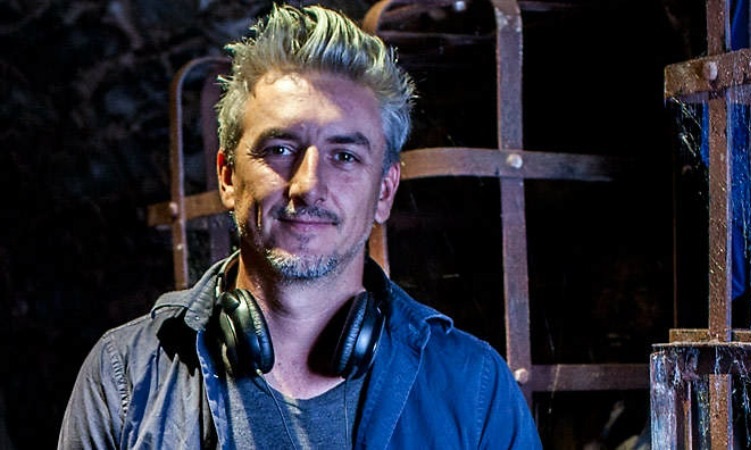The Belko Experiment is a brilliant film. It’s a blackly comic, oppressively bleak and brutally violent rugby tackle of a film, crashing into you with all it has and leaving you in a heap before sprinting off down the pitch, its smash and dash effect owing to a taut sub-90 minute runtime. Its UK release cinema release was fairly low key, tethered to the launch of the much higher profile Guardians Of The Galaxy Volume 2 (the two films share writer-in-common James Gunn). While Gunn’s terrific Guardians sequel thrilled a considerably larger audience, it was his collaboration with Wolf Creek director Greg McLean, released just two weeks earlier, that really tickled this writer’s brain.
With the home video release of both films imminent (again, Belko arrives two weeks ahead) we had the opportunity to chat with The Belko Experiment director Greg McLean. As Den of Geek hunched over a desk in a dingy cupboard in London, which is where they keep us, we connected with the director in his native Australia, in a place called Quorn in the outback, where the shoot for the second season of the TV take on Wolf Creek was shooting. We found it hard to shake the notion that we’d copped the raw end of that deal.
Here’s how our chat with Greg McLean went.
This is the first film you’ve directed that you didn’t write. How was that as an experience?
It was a different process for me but it was a very fun one, taking on someone else’s script. I think the key thing was finding a script that I absolutely adored. I fell in love with the characters and the actual writing so much. Once I read it, and I read it very quickly as soon as I got it, I just fell totally head over heels in love with it. At that point I was just like ‘how do I get to direct this movie?’
Because the writing was so good and the characters were so clear and to me it seemed like a great opportunity to just play the director, and to go in and show off what I can do as a filmmaker, as opposed to taking the 4 or 5 years to write and direct and come up with the whole thing. So I think the primary thing was just finding a script that I gelled with, from page one to page 110 or whatever it was, and then just giving myself as a filmmaker to bring that to life.
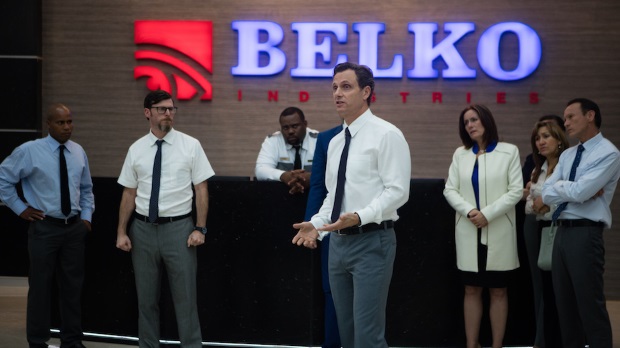
And it can’t have been too bad because your next film, Jungle, it was the same case on that, right?
It was, yeah. That was another where I just read a script where the story moved me very strongly. They’re very different films. Jungle is the true life story of a guy who gets lost in the jungle and it’s a very different kind of genre, it’s a more real life adventure story, whereas Belko was a crazy high-concept action horror film.
But again it was just really connecting with the story and the script. The script on Jungle was phenomenal; it was just as a filmmaker going in and saying ‘what’s something that can challenge me as a director?’ I’m basically looking for things to test me out. Ultimately I want to find things that I don’t know if I can pull off, go into them and see if I can, and hopefully by the time I finish it audiences agree that I have pulled something off.
(The next question, which you can find below Daphne the spoiler squirrel, contains some mild spoilers. You can pick up at the next question.)
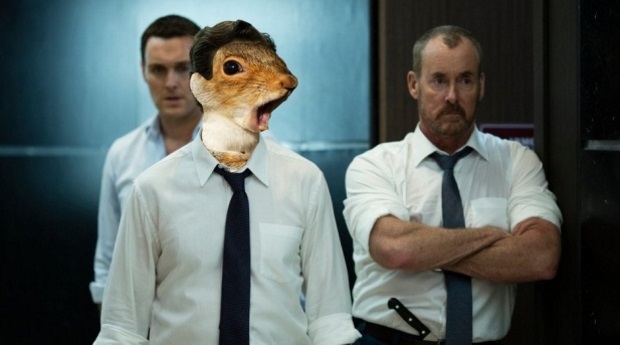
One of my favourite scenes in The Belko Experiment is towards the end of the film, and it’s two people fighting with a corporate PowerPoint presentation being projected onto them. Was that in the script? How did you bring that scene together?
That wasn’t in the script. That scene in the script was basically written as just a fight that happened between the two characters. When I read the script I had my own personal view on what I thought the thematic to the film was. And for me it was all about, when you take the corporate ideology to its logical extreme, it ends in The Belko Experiment, which is basically people being forced to kill for the success of the bottom line. So to me there was this concept whereby it was about showing the evil of corporations.
And I pitched it to James (Gunn) and Peter (Safran), they were like ‘yeah, that’s all cool, that’s fine if you want to do that, but that’s not what James wrote a script about’. But to me it was important to talk about that metaphor, of what Belko was, what it represents and what Belko was a metaphor for. Corporations gone horribly wrong.
So that final sequence was really about seeing these two human beings forced to kill each other over this happy, sappy PowerPoint presentation about encouraging these workers to reach this bottom line that is completely illusory. It’s a kind of Orwellian idea that I was hoping to get in that final scene that obviously you got, and hopefully other people get that as well, cause that’s really what I was going for. I was trying to illustrate the point that the level at which the corporate ideology takes the wrong way is really a very evil kind of thing, because it means the negation of the human spirit, the individual.
Another one of the themes is morality. What feels like the morally right thing in this film isn’t always the correct thing in terms of saving lives. Do you think there might be a way to tell the same story where the bad guys are actually the good guys?
I don’t know. I like to approach all the points of view without too much judgement. Like, in terms of Norris (Tony Goldwin) and his crew, I tried to present them in a way that was not too judgemental because obviously Norris is the more right-wing approach to life, where it’s basically saying let’s get the strongest guys together, it’s survival of the fittest and anyone who doesn’t fit into that is gonna fall by the wayside.
Whereas Mike (John Gallagher Jnr.) is much more of a liberal point of view, which is saying we can all succeed together if we just look after people. So I tried to be fair to both points of view. There certainly would be members of the audience who will look at the Norris character and think ‘that’s a terribly reasonable approach to take, we should protect ourselves, let’s do that’. So, in terms of morality, I feel like as a filmmaker I was just trying to put it out there pretty objectively and let the audience decide which side they think they would go on.
I think my favourite character in the film is Wendell, played by John C. McGinley.
*laughs* He’s so many people’s favourite character. It’s so funny. Cause he’s so great as that character!
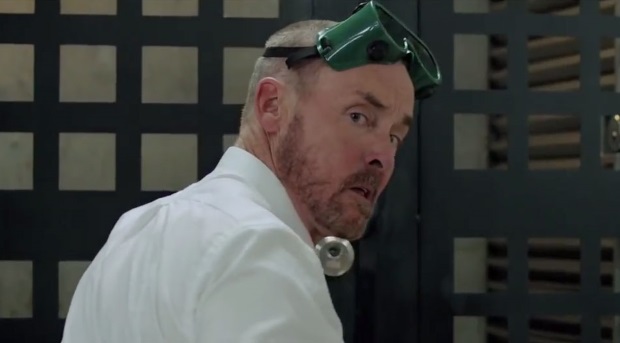
He’s fantastic. What I like about him, his character… he’s enjoying it too much.
Right. He’s been waiting his whole life for this moment to happen, where he can re-enact his greatest moment in the past, when he was in the military. He can suddenly use all that skill and training and it’s done where he’s always gonna be the winner.
What was he like on set? Was he able to pop in and out of character or was he quite intense?
John was pretty intense. He was also a really enjoyable guy to hang out with, really fun. I’m a huge Oliver Stone fan so I just spent the entire time basically grilling him about shooting Platoon, shooting Wall Street, shooting all of the Oliver Stone films that he’s been in. But he’s such a great actor.
I love working with actors. I love watching people work. When you have an actor like that who brings so much to the character, so much life, brings all the levels to that character that aren’t in the script. The script obviously gives him a blueprint but then he creates this entire backstory for that character, which is what people respond to, because he fills it with so much tragedy and menace and it’s scary and it’s threatening. He kind of just filled that character out with his own creativity which I think is phenomenal in the film.
One of the interesting things about this film is that it’s quite a low budget movie, which I’m guessing is partly the case because you do some pretty extreme things in it. Are there things you would have done with a bit more money, and I wonder what you think it might have cost you in terms of freedom?
There’s no question this could have been done for more money but less freedom. James Gunn wrote the script years ago, was going to do it himself, for various reasons he didn’t do it and went on and had a different career. MGM still wanted to make this movie because the script had become quite famous as the craziest script, everyone loved this script but no one wanted to do it because they didn’t have the balls to do it. And then finally after James made Guardians Of The Galaxy MGM head of production John Glickman called saying “What are you doing with Belko?” and James said “I’d love to do it. I don’t have time to direct it. If I can choose the director and it doesn’t get interfered with at all, if I can make it as hardcore and violent as I want, I’ll do it.” And they said ok.
So the reason we kept the budget down was so we could be absolutely free with the content, and not have anyone screw with us in terms of making it totally full-on. So it was ‘If you can do it for low budget, you can do it. If you go over that it’s going to become a big deal.’
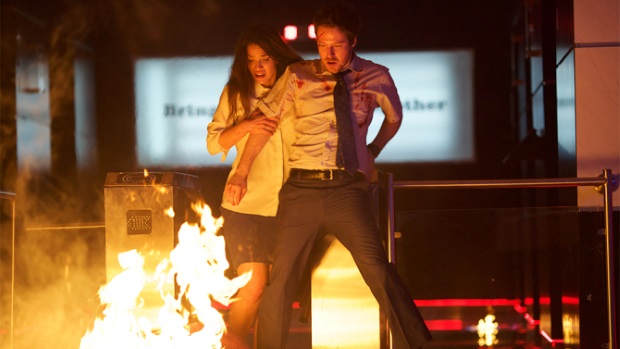
Am I right in saying you shot in Colombia?
We shot the whole film in Bogota, Colombia. We built a couple of giant sets for the big foyer sequence, we shot that on a big set we built in a warehouse on the outskirts of Colombia. We shot in a couple of insurance buildings. And we took over an unfinished office building and shot in there.
Is it difficult to enter into a high pressure situation, like shooting a film like this, completely detached from your home comforts?
It was probably the toughest shoot I’ve ever done. I think for me, at the time I took the job, I was looking for a challenge. I’d never done a film before without people that I knew, or crew that I knew, or actors that I knew. This is the first time that I chose a film to do where it was an entirely new group. I knew no one on this project. I’d never met James before, never met Pete before. I didn’t know MGM, I didn’t know the actors. And I basically just said ‘you know what? It seems like a really cool challenge. I really adore the script, I think it’s fantastic, and I’d love to see if I could’.
Because I’ve done a lot of films that use the landscape and outdoor locations to talk about the character, so I thought I’d love to use an interior space to talk about character and atmosphere and setting. That certainly was my challenge as the director. That is what I was really attracted to in choosing the script.
What’s the state of play with Jungle at the moment? Can we expect to see that soon?
Yes. So Jungle will come out, in the US it’s being released I think on October 20th by EOne. So EOne are releasing it in the US, and I expect the international release to be shortly after that.
It’s been sold to every territory in the world. I said that I thought Belko was the hardest film I’ve ever directed because it was a very challenging shoot, because of the time we had to make the movie and the money we had. When I did Jungle I revised that, because it was equally as hard because we had to shoot this film entirely in the jungles of Colombia. I went back to Colombia to shoot Jungle. That was a challenge. But we had the wonderful Daniel Radcliffe, who was amazing to work with.
What is your favourite Jason Statham film?
I would have to say my favourite Jason Statham film is Lock, Stock And Two Smoking Barrels. Take it back to where it all began.
Greg McLean, thank you very much.
The Belko Experiment is available on DVD & Blu-ray now.

